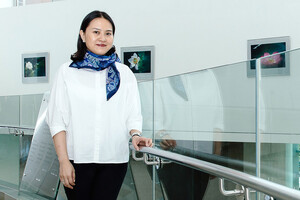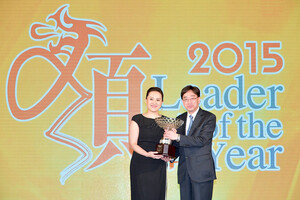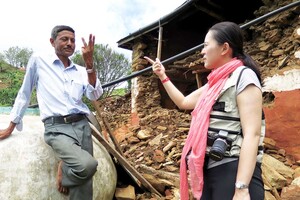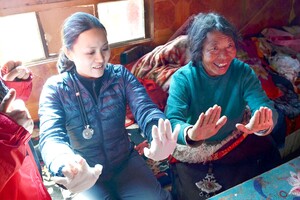Fine Folks Fine Deeds
Emily Chan—Treading Tender Territories

Professor Emily Chan
On the night when she was awarded the title 'Leader of the Year 2015', Emily Chan was wearing a black maxi dress and had her chandelier earrings on. But she is found more often in disaster-devastated areas than in high-society parties. Post-quake Nepal was one place where she carried out her work; some place high on the Qinghai-Tibetan Plateau was where she gave public health lessons to her students or the natives.
The many hats Emily Chan wears include Director of the Collaborating Centre for Oxford University and CUHK for Disaster and Medical Humanitarian Response (CCOUC), Director of the Centre for Global Health, CUHK, Associate Director of the Jockey Club School of Public Health and Primary Care at CUHK, Vice-Chair of the Council of Oxfam Hong Kong, and a member of the Asia Science Technology and Academia Advisory Group of the United Nations Office for Disaster Risk Reduction.
Emily studied biomedical engineering at John Hopkins University, and had medicine in sight. During the first two years, she had to spend eight hours a week in the laboratory but she didn't really enjoy it. Her advisor encouraged her to see the world and arranged for her to work as a junior research assistant to a UNICEF delegation to Zimbabwe, to help the children there who had nutritional problems due to a recent drought. Emily's mother was understandably concerned, but nonetheless showed her support and paid for her air tickets.

Emily Chan awarded the title 'Leader of the Year 2015'
New faces and new challenges in Africa excited Emily and kindled her thirst for new knowledge and experience. One night, learning of the imminent delivery of a woman about her age in a faraway village, Emily walked many miles in order to witness the birth of a new life, but was only able to greet the death of a premature infant. The midwife, accustomed to such an outcome, wrapped the body in cloth and handed it to the mother. Emily recalled, 'The fatigued mother crawled across the room and held the baby up to me. I did not know what to do, but nonetheless took a glass of warm water and started to wipe the blood from the baby’s face, and tried to resuscitate it.' Emily did that for more than 10 minutes, until the mother pulled at her hand, nodded and then took the body back.
Emily walked for another three hours to return to the camp site. She did not recall how she felt. The only thing she recalled was the full moon that weighed down on her head. When she saw the first human being at the camp, a German nurse from the delegation, she broke down. 'She comforted me by saying that I had already done the best in that difficult situation. During the eight weeks in Zimbabwe, I was so impressed and inspired by the passion and rationality demonstrated by the delegation that I made up my mind to commit myself to humanitarian relief. That led me to study public health at Harvard later.'

Emily Chan assessing the quake's aftermath in Nepal in June 2015. Topalo, teacher and head of Pipalthok Village, tells of his determination to equip local children with better knowledge of disaster preparedness
As Emily witnessed more disheartening scenes, she gradually developed her own philosophy. 'Life is illusive. I'm concerned about how to make the best out of adversity, or how to enhance the quality of the remaining hours of a life slipping away in front of me. Yes, I sound positive—not that I don’t understand how cruel reality can be, but the darker the outside gets the more important it is to keep the light shining within.'
Does Emily simply go out to rescue with tools in her knapsack or bring students to provide nursing care for the wounded in disaster areas? She explains, 'CCOUC is a platform for research, education and knowledge transfer. Seventy per cent of our effort is evidence-based international ollaborative research on disaster preparedness of high-risk areas, namely, Asian villages on the earthquake belts and in flood-risk areas, in order to minimize damages. When these areas are struck, we will provide technical support in medical and public health aspects. We will also review the level of disaster preparedness.'
Emily always reminds her students not to assume the superior role of a giver or a reformer. 'They are not volunteers, but learners, and their teachers are the villagers who kindly allow us to walk into their homes and learn about their lives. We as receivers are in no position to impose instant changes on them in a brief visit, though our suggestions like quit smoking or washing hands for hygienic reasons are scientifically sound.' Only students with basic knowledge in public health and nursing skills are selected for training. A high level of sensitivity is also required to curb disaster tourist behaviours.

Conducting a basic examination of a Tibetan woman
Travelling expenses are needed to get any overseas fieldwork off the ground. Soliciting air ticket sponsorship for students has become a key task for Emily. Her father, paediatrician Dr. Chan Chok-wan, has set up the Mrs. Catherine SW Chan-Kwok Prize in Humanitarian Field Work Endowment Fund named after his late wife, to help students gain more exposure as Emily was able to get from her mother years ago. CCOUC was established under a CUHK-Oxford collaborative agreement and depends mainly on donations for its operation funds.
Foreseeing an expanding scope for disaster and humanitarian relief, Emily hopes that it will become an academic discipline of the University. 'I wish to see more young people taking courses in disaster relief and bring vigour and new ideas to this field, and contribute to our community, our country, Asia and beyond as global citizens.'
(Source: Information Services Office, The Chinese University of Hong Kong)


